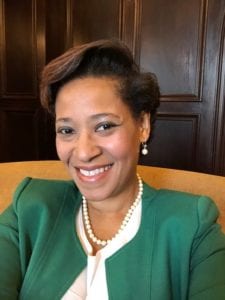By Lee Chottiner
Community Editor
Melanie House-Mansfield became the target of fear tactics at an early age – shortly after her birth, in fact.
“My grandmother (living in England) was called up and she was told if my mother kept on talking, I would die,” House-Mansfield said.
Her mother was Amelia Blossom Pegram, a noted South African poet and anti-Apartheid activist, black and Jewish. Pegram, who today lives in Louisville, had to leave her country in 1963 because of her activities.
Growing up in Elizabethtown, near Fort Knox, where her father, Army Sgt. Major Charles Lenford House Sr., was stationed, House-Mansfield learned never to open a package mailed to their home.
“My dad, may he rest in peace, was in the military, so any big package that came, my dad would get it x-rayed before opening,” she said.
“I lived with the idea that people are there, and things are real.”
Today, House-Mansfield, a theater teacher in the Jefferson County Public Schools, a self-described “army brat,” a former Kentucky State University regent and past LMPD Citizen Advisory Board member, is well suited to understand the outrage, fear and other emotions felt by blacks, Jews and other groups caught up in the current crisis.
Peaceful protests and after-dark violence have going on in cities across the country since the May 25 violent death of George Floyd under the knee of a Minneapolis, Minnesota, police officer. That officer has since been charged with murder. Since then, in Atlanta, the Fulton County district attorney has announced that he will seek murder charges against an officer there for shooting a black man in the back.
“I’m sitting there looking at all this emotion going on and I’m like, wow!” House-Mansfield said. “It is as though the stuff my mother used to tell me is happening all around me now.”
Here are some of her some takeaways:
- Peaceful acts can steal the spotlight from vandals. House-Mansfield said she was struck by the waves of people taking a knee before police, cleaning up after looting and generally performing acts of peaceful protest.
“It helps us emotionally, on a rational level, and I have to commend people who do that,” she said. - Clerics must stand together. “For the leaders of black churches in Louisville, and synagogues and mosques, this is a good time,” House-Mansfield said. “This is a time for rabbis, imams, preachers and priests to come together and lead. It’s a time for governors and the mayors, everybody, to really sit down and figure this out. But it’s also a time for our better angels to come out.”
- The country may be ripe for “truth and reconciliation commissions” like those that were held in South Africa after the fall of apartheid. Enacted by Bishop Desmond Tutu, the commissions were forums through which victims and perpetrators of violence alike could testify, seeking reparations or amnesty, and enabling the country to move forward. Given the tension between police and people of color, House-Mansfield thinks the idea could work here, too.
“That’s really what we need. As Jews, we had truth and reconciliation,” she said, referring, in part, to the Nuremberg trials, “but for African Americans, we never had that happen for real. The disparities in health care and institutionalized racism have never been addressed.”
“The biggest issue, she added, “is people don’t have a voice; people don’t have power and people don’t feel safe.”



